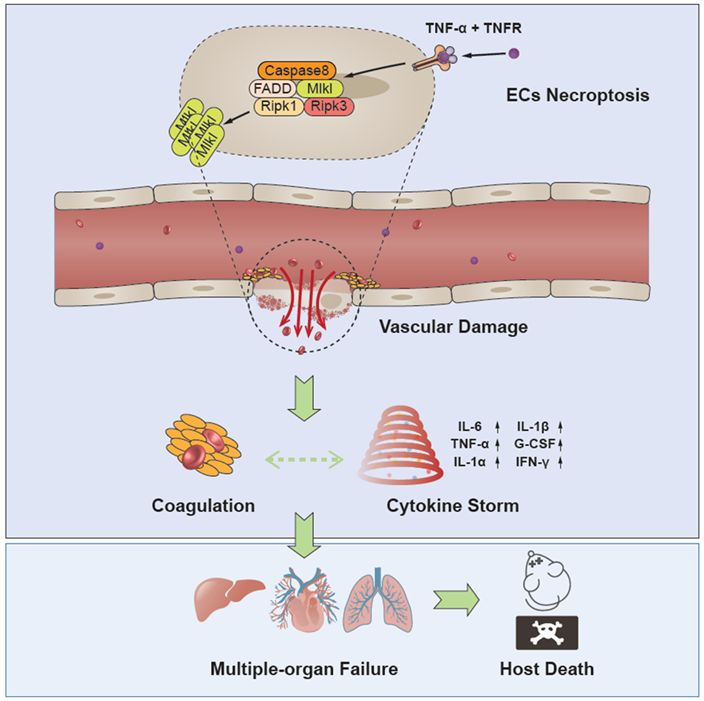A recent study led by Prof. ZHANG Haibing’s group at the Shanghai Institute of Nutrition and Health (SINH), Chinese Academy of Sciences (CAS) revealed how endothelial cell (EC) necroptosis mediated the destruction of endothelial integrity and vascular injury, and ultimately induced multiple organ dysfunction syndrome (MODS) and mortality in the pathogenesis of SIRS.
Overproduction of cytokines can trigger life-threatening SIRS, leading to MODS and mortality. Although both coagulopathy and necroptosis have been identified as important factors in the pathogenesis of SIRS, the specific cell types undergoing necroptosis and their interplay with coagulopathy remain unclear. Therefore, there is no effective therapy for SIRS patients.
To illuminate these interrelationships, researchers utilized visualization analysis via intravital microscopy to demonstrate that both anticoagulant heparin and nonanticoagulant heparin (NAH) pretreatment protect mice from TNF-α-induced mortality in SIRS. Moreover, the deletion of Mlkl or Ripk3 resulted in decreased coagulation and reduced mortality in TNF-α-induced SIRS. These findings suggested that necroptosis acts upstream of coagulation in SIRS-related mortality.
Using a genetic lineage tracing mouse model (Tie2-Cre;Rosa26-tdT), they traced ECs and verified that EC necroptosis is responsible for the vascular damage observed in TNF-α-treated mice. Importantly, Mlkl deletion in vascular ECs in mice had a similar protective effect against lethal SIRS by blocking EC necroptosis to preserve the integrity of the endothelium.
In summary, this study revealed that RIPK3-MLKL-dependent necroptosis disrupted vascular integrity, resulting in coagulopathy and multiorgan failure, eventually leading to mortality in SIRS patients. These results highlight the importance of targeting vascular EC necroptosis for developing effective treatments for SIRS patients.
Entitled “MLKL-mediated endothelial necroptosis drives vascular damage and mortality in systemic inflammatory response syndrome”, this study was published in Cellular & Molecular Immunology on Sept. 30, 2024.
This work was supported by the National Key Research and Development Program of China, the National Natural Science Foundation of China, the Shanghai Excellent Academic/Technical Leader Program, the Shanghai Science and Technology Commission, the China Postdoctoral Science Foundation, and Shanghai Municipal Science and Technology Major Project.

The crucial role of EC necroptosis in multiple organ failure and mortality induced by SIRS.
(Image by Prof. ZHANG Haibing's Group)
Media Contact:
WANG Jin
Shanghai Institute of Nutrition and Health,
Chinese Academy of Sciences
Email: wangjin01@sinh.ac.cn
Web: http://english.sinh.cas.cn/

